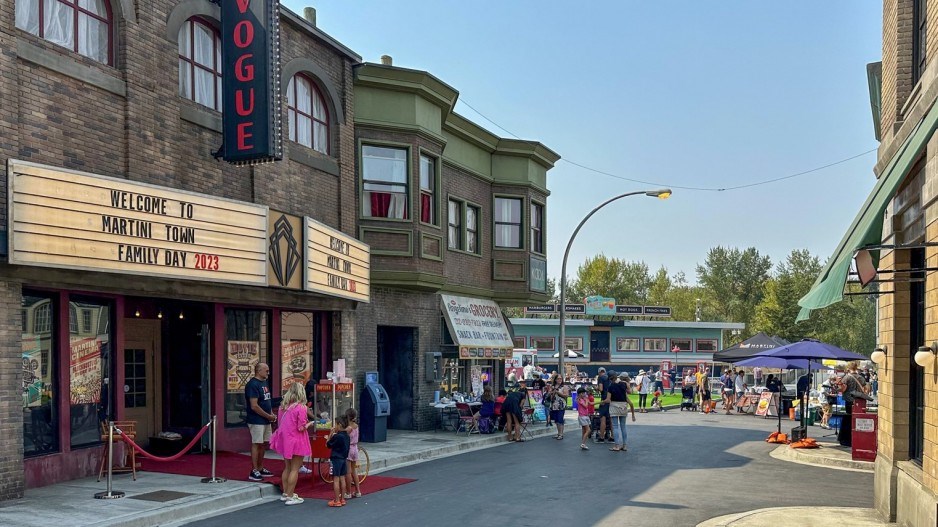Nearly two-dozen film and television productions are currently active in B.C. – an indication that industry activity continues to recover following creative industry strikes in the U.S. that brought productions in Canada to a standstill.
The after-effects of dual Hollywood strikes are still being felt and local activity is “off to a slow start,” said Gemma Martini, founder and CEO of Martini Film Studios. Still, more productions and greater demand for filming in Metro Vancouver are expected as the year progresses, according to those who spoke to BIV.
“It’s only really in the last couple of weeks that the studios down in Los Angeles are really starting their planning,” said Martini.
“We’re seeing a lot more activity in the last week or so. We’re quite hopeful.”
At the time of writing, there were 22 film and TV productions active across the province, according to Creative BC, an independent industry association funded by the province.
This is 40 per cent below the 33 productions that would typically be active at this time of year, according to the Ministry of Tourism, Arts, Culture and Sport.
Those who spoke to BIV described the industry as currently being in a “flux period, a “reset” and a “re-adjustment.”
This reset is the result of a strike launched by the Writers Guild of America, which lasted 148 days, and job action by the Screen Actors Guild-American Federation of Television and Radio Artists, which went on strike for 118 days.
Issues such as better pay, the use of artificial intelligence and the industry impact of streaming services have been cited as reasons for the labour strikes.
“Both the writers’ and actors’ strikes have been incredibly challenging for everyone working in B.C.’s film and television industry and we know they are excited to get back to work,” the ministry said in a statement to BIV.
“In November, the Motion Picture Production Industry Association of BC led a trip to Los Angeles to meet with Hollywood studios and jump start the return.”
The show Superman and Lois has already begun production on their fourth season, which is being filmed in Richmond. Season two of The Last of Us also started filming locally on Jan. 7, according to a listing on the Film and Television Industry Alliance’s website.
It is estimated that it will take until the spring for activity to reach levels typically seen within the Metro Vancouver region, said Martini and Geoff Teoli, film commissioner of Vancouver.
“There’s a lot of pent-up demand.… Everyone that was either just about to begin or had to stop during the strikes, they’re all back at it really quickly and there’s a lot more still in the pipeline that’s going to get started,” he said.
In the decade since 2012, the film, TV, visual effects and animation industries in B.C. have collectively invested $30.1 billion in the provincial economy, according to a 2022 report by the Vancouver Economic Commission.
As production activity ramps back up in B.C., so too does global competition, according to Martini.
“It’s more of a competitive landscape,” she said. “Budgets are tighter and there’s just generally fewer productions than there was before. So, that makes for greater competition and fewer shows that we’re fighting for with other regions.”
Vancouver’s main competitors are Toronto, Los Angeles, Atlanta, New York and London, according to Teoli.
Amazon MGM Studios announced on Jan. 17 that they have entered into an exclusive contract with Pinewood Toronto Studios to use roughly 160,000 square feet of space. This represents the first multi-year commitment by Amazon MGM Studios to use Canadian studio space, according to Amazon Canada.
“I wish we got that here in British Columbia, to be honest. However, we didn’t have that opportunity,” said Martini.
The availability of stage space continues to increase locally. Burnaby-based Bridge Studios in 2022 announced plans to build 42 sound stages in Vancouver over the course of four years – the company’s biggest expansion to date. The project will bring Bridge Studios’ total number of sound stages to 55, according to the company.
“You have a lot of people that are putting together these fantastic facilities, which will be grand. But at the same time, I worry that all other jurisdictions have done the same thing too,” said Patrick Doiron, president Industrial Works Ltd., a company that specializes in facilitating and promoting local locations for film production.
“It’s a good thing a couple years from now, as long as everyone can survive to get to there.”
One of Metro Vancouver’s advantages is a reputation for being able to deliver on time and on budget, said Teoli.
“Studios are starting to be more focused on finances and making sure that they’re able to turn a profit as opposed to just creating content,” he said. “You want to go to a place that’s got a reputation for being on time and on budget. That actually works in Vancouver’s favour.”
Going forward, Teoli said the biggest challenge for B.C.’s film and TV industry will be managing scheduling, especially as activity levels continue to recover.
“The focus right now is keeping support up, making sure that everyone can get back up on their feet as quickly as possible and really having a lot of patience and understanding for what everyone’s had to deal with for the last year,” he said.



